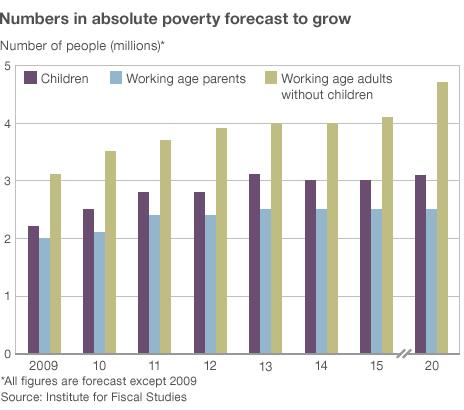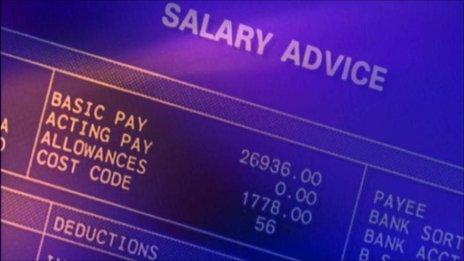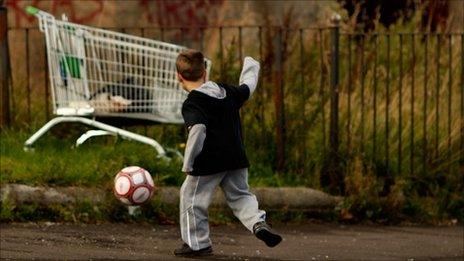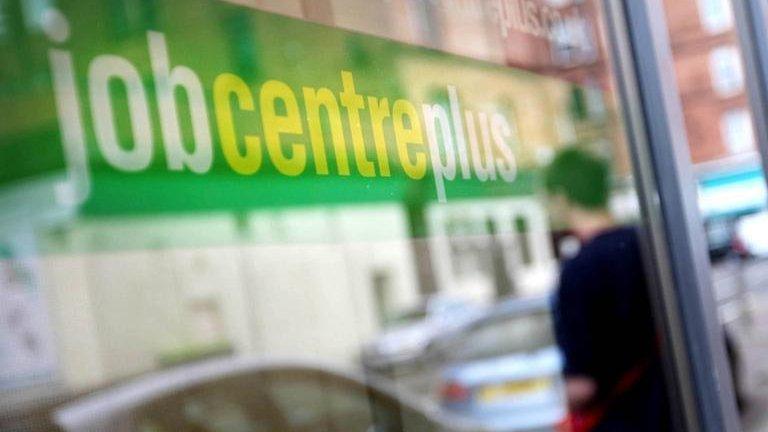UK seeing a big rise in poverty, says IFS
- Published
Steven Ellis: "It's slowly getting more of a squeeze"
Falling incomes will mean the biggest drop for middle-income families since the 1970s, says a report from the Institute for Fiscal Studies.
The IFS forecasts two years "dominated by a large decline" in incomes, pushing 600,000 more children into poverty,
By 2013 there will be 3.1 million children in poverty in the UK, according to the IFS projections.
A Department for Work and Pensions spokesman said benefits changes would tackle poverty by "making work pay".
Squeezed middle
The report from the IFS, external independent financial research organisation forecasts the levels of poverty in the years up to 2015-16 and then in 2020.
It uses the technical term of "absolute" poverty, which is not about what people can or cannot afford but a measure in relation to other earnings - in this case defined as being below 60% of the median income, adjusted for inflation.
Sally Copley of Save the Children explains how child poverty is defined
The IFS says that in 2010, 2.5 million children and 2.1 million working-age parents were living in "absolute" poverty.
But it warns that in the next two years poverty levels will get worse.
By 2013, the IFS predicts the number of children in absolute poverty will rise by 600,000, peaking at 3.1 million, along with 2.5 million working-age parents and four million working-age adults without children.
The report also issues a stark warning of tough times for people in the so-called "squeezed middle" - with median incomes falling by 7%, after inflation has been taken into account, the sharpest drop in 35 years.
"This would be the largest three-year fall in median income since 1974-77," said report co-author, Robert Joyce.
These were the years following the oil crisis and included a sterling crisis, IMF bail-out and industrial unrest.
Universal Credit
After 2013 and the planned introduction the Universal Credit scheme, the IFS is forecasting that absolute child poverty will fall by 100,000 to three million in 2014 and 2015.
There will also be more optimism for middle earners, with incomes rising slowly after 2013 - although it is projected that 2015 income levels will still be below where they were six years earlier.
The prospects remain uncertain for the poorest in 2015 - with the IFS predicting that the number of working-age adults in absolute poverty will remain at 2.5 million for parents and will rise to 4.1 million for working-age adults without children.
By 2020, the IFS is projecting there will be 4.7 million working-age adults without children in absolute poverty, up by 1.6 million compared with 2009.
The report, funded by the Joseph Rowntree Foundation, also confirms that targets set in 2010 to cut absolute child poverty by 2020 to 5% are likely to be missed by a wide margin - with the IFS forecasting it will be 23%.
The Universal Credit being proposed by the government is designed to replace six income-related work-based benefits.
The government wants a system where people are better off in work than they would be on benefits.
The IFS says this should directly reduce the number of children in poverty by 450,000, and adults in poverty by 600,000, by 2020-21.
Missed targets
Report co-author James Browne warned that the targets adopted on cutting child poverty by 2020 could not be achieved with the current trends.
He said the previous government had cut child poverty by nearly a quarter between 1998 and 2009 after it increased spending on benefits and tax credits. However, this was not enough for the government to hit its child poverty targets.
Mr Browne added that even if there was an immense increase in the resources made available, it was hard to see how the legally binding targets to reduce child poverty could be achieved in nine years.
Speaking on BBC Radio 4's Today programme, Universities Minister David Willetts said: "The country is not as well off as we thought.
"There are things we can do. We've tried to hold down fuel duty, freezing council tax, have increased the income tax allowance.
"We're tried to do the things that help, but you can't ignore the basic rules of economics that when you inherit a situation where the economy has shrunk by 7% there isn't the money there."
Responding to the IFS forecast, Barnardo's chief executive Anne Marie Carrie said: "The projected figures for child poverty revealed today are a tragedy.
"This isn't just about statistics as every day thousands of families are being forced into making choices between heating or eating."
Poverty trap
Alison Garnham, Chief Executive of Child Poverty Action Group, said: "Ministers seem to be in denial that, under current policies, their legacy threatens to be the worst poverty record of any government for a generation.
"They risk damaging childhoods and children's life chances, as well as our national economic wellbeing from wasted potential and social costs spiral. It would be a catastrophic failure in public policy and political leadership."
Shadow Work and Pensions Secretary Liam Byrne said: "David Cameron promised us he would not increase child poverty. Now we have the truth. The Tory-led Government's decision to cut too far and too fast this year will condemn hundreds of thousands more children to grow up poor."
A spokesman for the Department for Work and Pensions argued that the Universal Credit would bring more families into work - and that it would break the cycle of poverty.
"The IFS acknowledge that Universal Credit will substantially reduce child poverty.
"It will make work pay for the first time, tackling in-work poverty and lift over one million people, including 450,000 children, out of poverty.
"Our wide-ranging reforms will have a dynamic impact on some of the poorest families, encouraging people into work, many for the first time, and improving the life chances of children at an early age.
"Over the last decade billions of pounds have been moved around the tax and benefit system in an attempt to address poverty. This has had the perverse effect of trapping thousands of families on benefits while income inequality increased to its highest ever level.
"It is clear that sticking with the status quo, which has had no meaningful long-term effect on poverty projections, is not an option."

- Published11 October 2011

- Published11 October 2011
- Published12 May 2011

- Published5 April 2011
- Published15 February 2015
